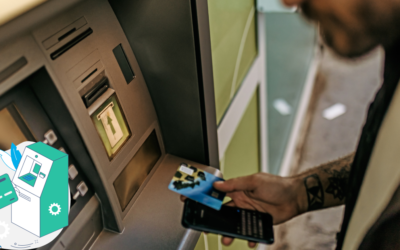Financial Insights For The Curious Reader
Sometimes, you are on the lookout to learn a little more about what’s going on out there. Our financial insights will help you learn more about the matters on money, economy, data, and the fintech ecosystem.
Featured Insights
Busting the Blacklist Loan Myth – Why You Are Not Blacklisted
Let’s look at what it really means to be blacklisted and where the term comes from…
The Guide to Navigating A Consumer Data Breach
What to do when personal information is taken from a system, without their knowledge or authorization…
Can I Get a Job When I am Blacklisted?
Being blacklisted will decrease your chances to get a new job. Especially when you work through traditional recruitment agencies…
The 5 Parts to How Your Credit Score Is Calculated
Credit scores can be confusing to understand. Have you ever wondered how your credit score is calculated…
What can you expect to read in our Financial Insights?
There are more financial news sources than a person can follow these days. Instead of competing with the editorial powerhouses out there, our financial insights section is a place where you can read unique scenarios and opinions relevant to everyday people. The biggest and most important financial updates will also be available here. Think budget speeches, prime lending rate updates, and big economy hits.
What can you expect under money insights?
From quick insights to in-depth breakdowns, we can help guide you through the world of personal finance, bringing together the best and most relevant information in a relevant and understandable way.
What unique insights do we discuss under debt management?
We talk about unique ways of getting debt free
Debt is not an endless spiral. There are fantastic tools and methods to addressing and paying off your debts in order to become debt-free and regain your financial freedom. Having a solid debt-tackling plan is key though, and using the right resources and info, it will make repaying your outstanding amounts a whole lot easier.
How you can better structure your debt
Almost everyone has debt in one form or another – whether it be a small personal loan or home loan that requires monthly repayments. How you manage those is what makes the difference. Keeping up with your payments and ensuring that they don’t get out of control is the best way to prepare to handle your monthly payments. Keeping track of how much you owe, to who you owe the money to, and when you need to pay by will help you manage your debt.
How to manage your debt repayments
There are a few key principles which are sure-fire ways to make sure that your debts get settled and using a comprehensive budget plan is the best start you can make.
Some quick debt-settling tips:
- Plan your expenses using a monthly budget.
- Always pay on time.
- At the very-least make the minimum payment amount every month.
- Focusing on and clearing the high interest-rate debts first. Pay all your debtors monthly and allocate any additional cash to these debts where possible.
What unique insights do we discuss under personal finance management?
Personal finance management involves the management and spending of your personal income, along with looking at how you can turn your current cash flow into wealth.
Cash flow
Before you can build a budget plan around your personal finance, you need to get familiar with your monthly cash flow. This cash flow is how much money is coming in and out of your account. Putting your cash inflow (money you’re getting in, such as your salary) against your cash outflow (money going out) will give you your net cash flow, which can be used to further settle debts or try and build wealth from.
Savings plans
A saving plan is a strategy whereby you try to use your disposable cash (the excess money you have after all your costs) to build up a savings amount. This savings can eventually be used as a form of security for unforeseen expenses or can be used to clear debts or put a down-payment on a larger purchase.
Investment strategies
Different to saving plans, investment strategies should look at more long-term goals and how to generate more money out of your existing cash. Investments will usually involve you purchasing shares or assets which will gain value over time. Putting together an investment strategy based on your goals and aspirations will help provide you with security and profits in the long run.
Tax perspectives
While your immediate cash flow and savings are important to consider when making an investment or notable purchase, tax plays an important role too. There are South African tax laws which will require amounts to be paid on certain purchases (such as transfer duties when purchasing a home) that need to be considered. Does your budget allow for the taxes involved in your financial decisions?
Unique personal finance calculators and spreadsheets
While it can be overwhelming, there are some amazing personal finance calculators and tools available to help you get your money-plan and personal finance goals on track! My FinCheck is a tool which can help determine your credit score and provide you with a number of options and investment opportunities which will suit your needs.
Using spreadsheets is a great way to put your personal budget plan together, separating your costs, incoming cash, and debts you need to pay monthly. This can help you keep on top of your financial commitments and help grow your money.
What insights do we discuss under credit health management?
What is a credit report
A credit report is a background on your credit history and financial situation. This credit report shows how you have managed past debts, what you borrowed the money for, and whether you paid it back on time or not. This helps creditors get a glimpse of your ‘creditworthiness’.
How do you read a credit report
A credit report will usually contain a number associated with your ‘credit worthiness’. It will range from 0 to 705, and is calculated based on your ability to pay back any money borrowed. The higher the score, the better you look to potential lenders.
How do you use a credit report
A credit report can be used to acquire credit from banks, financial institutions or other authorised credit providers. Having a healthy credit report is essential if you want to borrow money to buy a house or a car, or to get a cellphone contract or open a clothing account.
How to use your credit report to build your credit health
If you want to build and maintain a good credit record, it’s important to use credit in the right way. You can do this by doing the following:
- Only borrowing what you can afford.
- Make all your payments on time.
- Paying off your accounts as quickly as possible.
- Keeping your credit balances low.
What can you expect under insurance insights?
The insurance industry in South Africa offers consumers the ability to sign-up for insurance policies, which are meant to offer financial security in case of emergencies for things like vehicle and home damage, job loss, and death.
What are the top insurance products a person should have?
Your insurance products should protect your assets, such as home insurance, vehicle insurance, and other key assets you may have. But the most important product you should have is a medical insurance policy.
What is insurtech and why should you care?
Coming from the two words “insurance” and “tech”, insurtech is simply the use of technology to optimise and enhance the products and policies insurance companies offer.
Insurtech products or tools can help you find the best solution for your needs, using technology and data to find the most ideal match for your budget, needs, and lifestyle.
Clever ways of doing insurance that no one talks about
The insurance industry has seen massive disruption in recent years with the introduction of technology and more micro-insurers. There are more ways of getting your goods or assets covered than ever before.
Interesting insurance providers
Pineapple – Pineapple insurance is a peer-to-peer insurtech platform which allows you to insure individual items by taking a photo of the item via their intuitive app.
Naked insurance – Naked insurance uses AI technology to speed up the sign-up, insuring, and claims processes.
Interesting insurance products
Peer-to-Peer (P2P) Insurance – Peer-to-Peer (P2P) insurance is a risk sharing network where a group of individuals pool their premiums together to insure against a risk.
Black Box Insurance – Black box insurance is a program that offers premiums based on current driving behavior as opposed to historical performance.
Unique insurance products that you might need
If you own a house, vehicle, or just have some high-value personal goods, there are a variety of insurance products which can service those needs without breaking the bank. Furthermore, to safeguard your livelihood, there are options such as income insurance and health insurance policies to ensure that your ability to earn isn’t hindered by retrenchment or injury.
What is fintech and what insights will we look at?
The fintech industry can bring a new level of depth to analysing and understanding the needs and financial requirements of South Africans thanks to the use of technology and more innovative and custom-tailored products on the market.
How does financial technology improve your life?
Financial technology not only hopes lenders, insurance companies, and financial institutions, but also your own life. Fintech allows you to access companies and products directly thanks to new platforms, such as mobile apps, whereby you can learn about and access new services anytime and anywhere.
The ever-evolving technology has also allows for companies to offer more specific products and services to customers, rather than blanket offerings. Fintech therefore gives you the power to find the specific financial services that you need, rather than signing up for something that you don’t really want.
Why should you care about fintech?
The financial industry is changing and adopting technology more and more to deliver its products and services, whether it be through mobile apps, online tools, or using AI. Understanding and embracing these changes will help you find and access the best financial assistance for your needs.
What is the Fintech industry
The fintech industry is a dynamic and exciting space, whereby traditional financial service providers are capitalising on the exciting benefits of the latest technologies; and this results in you, as the customer, benefitting too.
Why is there a fintech industry
The fintech industry is a sign that the world is moving to a more online-oriented and technology-driven world. The fintech industry exists to utilise technology to offer better and more relevant products to consumers, while also gaining data and insights which previously weren’t accessible.
What are fintech companies and why are they called fintech
The fintech industry is made up of companies who are using technology to strengthen the services and products offered to customers. They’re called ‘fintech’ companies because they offer somewhat traditional financial services (such as loans, investing, or insurance) but take advantage of technology that more traditional companies don’t use. Many fintech companies often have a unique or cleverly-designed platform for which to do business through.
Fintech solutions
2 cool fintech solutions that have changed the way you live
Mobile investment apps – Fintech companies have embraced mobile to offer small-to-medium sized investing, all done through the convenience of smartphones.
Credit score calculators – While previously a long-winded process, new credit calculators have allowed normal individuals to access a wealth of information for free, and be directed to relevant products based on those results.
3 unique fintech solutions of the future
Peer-to-peer lending – Peer-to-peer (P2P) lending is when an individual borrows money from other individuals. This has become safer and possible thanks to the security fintech platforms provide. Similarly, peer-to-business (P2B) lending is when a business borrows money from one or multiple individuals.
Payment gateways – Payment gateways are platforms that enable shoppers to pay for a product or service on a merchant’s website. Today, there are countless payment methods such as debit cards, credit cards, digital wallets, and cryptocurrencies.
Digital insurance – Digital insurance takes a minimalist approach, offering life and health insurance with better underwriting practices with variable rates based on specific users’ profiles, therefore offering cheaper coverage compared to traditional insurance companies.
What is financial news?
Financial news covers all the happenings in the financial world, most specifically any updates that affect the economy, stock market, and taxes.
Engaging with financial news is the best way to keep tabs on what is going on with regards to money-matters in SA, but with so much information out there, finding the most accurate and relevant is always important.
Where can you read financial news?
Financial news is available in newspapers and online with a number of big-name companies specialising in financial insights, such as Fin24, MoneyWeb, and Business Day.
5 of our favourite financial news sources
What financial news will we talk about?
As mentioned, we don’t want to compete with the powerful financial news outlets that are doing a great job. We want to provide unique and helpful news insights into the most important topics in our user’s lives.
Budget speeches
The budget speech is important as it is the government providing information as to what they’ll be spending funds and taxes on, which directly affects your personal finances.
Repo rates, prime lending rates, interest rates
Repo rate – The repo rate is the interest rate commercial banks pay to borrow money from the Reserve Bank.
Prime lending rate – The prime lending rate is essentially the banks’ profit margin on loans. This is basically a marked-up version of the repo rate that banks use as a starting point to calculate interest rates for specific clients.
Interest rates – Interest rates are the percentage which lenders charge on the money you borrow, which is added to the repayments.
How the economy might influence your personal finance
Everything in the economy is interconnected to your personal finances. Increasing interest rates will affect what you pay for groceries, when buying a house, or how much you’ll pay for petrol. Big business and government decisions play a major role in determining the value of the Rand, which, in turn, affects the value of what’s in your pocket.
Important South African economy news
Any South African news pertaining to the economy, interest rates, taxes, and personal finance world will influence how you should spend your money. We’ll help you keep track of what’s developing to help guide your decision on the best financial solution.
Popular Articles
Where to Buy a Second-Hand Car in South Africa
Buying a car – especially a second-hand one – can feel a bit like trying to find treasure in a sea...
How the 2025 Budget will impact SA consumers
The 2025 national budget brings a mix of financial relief and added strain for South Africans....
Craft Your Savings Strategy During the Festive Break
The festive season is a time for joy and togetherness, but it’s also a great opportunity to plan...
Top 5 Cellphone Insurance Companies in SA
When it comes to protecting your cellphone, insurance is essential, especially for higher-end...
How much does the average funeral cost in SA?
Planning a funeral is never easy, emotionally or financially. In South Africa, the cost of a...
Saving tips for winter in South Africa
Winter in South Africa offers a unique charm, distinct from the typical image of snowy landscapes...
How to maximise savings and earnings mid-year
As May rolls in, South Africans are not only preparing for the winter chill but also it's almost...
How to navigate SA’s electricity hike
As South Africans, we are all too familiar with the annual increase in electricity tariffs. The...
Safeguarding Your Finances: Tips for South Africans to Ensure Financial Security
In today's fast-paced world, managing our finances effectively is more crucial than ever. For many...
When to take out a personal loan – the ultimate checklist
Let’s get real – taking out a personal loan should not be taken lightly, it’s a significant and...
Money Makeover: Your Ultimate Guide for Revamping Finances in the New Year
The reality of Janu-worry hits hard for many South Africans, as early December paychecks can make...
The ultimate financial guide for the festive season in SA
As the holiday season approaches, many South African consumers eagerly anticipate festive...
The savvy shopper’s guide to Black Friday in South Africa
Black Friday has become a global shopping phenomenon, and South Africa is no exception. This day,...
Top 5 cheapest cars to insure in South Africa
Car insurance is a necessary expense for South African drivers, but it doesn't have to break the...
10 steps to achieving financial fitness in your 20s
Your 20s are a pivotal period in your life when you have the opportunity to set the stage for a...




















